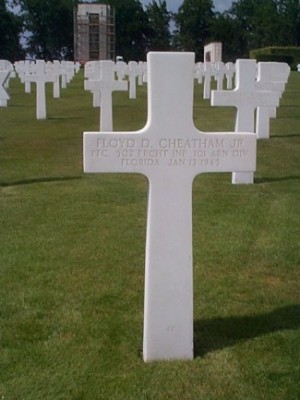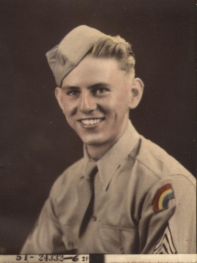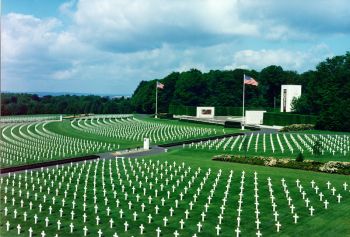 Floyd's Grave at Luxembourg American Cemetery and Memorial, Luxembourg City, LuxembourgTHE BATTLE OF THE BULGE–BASTOGNE The Battle of the Bulge took place in World War II. World War II is when the Germans tried to take over the world. World War II was from 1939 to 1945. America got into the War when Germany's partner, Japan, attacked Pearl Harbor on December 7, 1941.
Floyd's Grave at Luxembourg American Cemetery and Memorial, Luxembourg City, LuxembourgTHE BATTLE OF THE BULGE–BASTOGNE The Battle of the Bulge took place in World War II. World War II is when the Germans tried to take over the world. World War II was from 1939 to 1945. America got into the War when Germany's partner, Japan, attacked Pearl Harbor on December 7, 1941.In that time my dad's mom, Virginia Cheatham, was about 18 years old. She had a brother, Floyd Cheatham, who was about 20 years old. That would make him my great uncle. The main objective of World War II was to push the Germans back to Germany. Floyd graduated paratrooper school on July 23, 1944. He was assigned to the 101st Airborne Division. By that time the war had been going on for five years. In 1944 Nazi Germany controlled everything from Germany to their side of the Atlantic Ocean. America's strongest ally against Germany was Great Britain. Great Britain is a very large island, almost four times the size of Florida, and is located just off the coast of continental Europe. By this time the Allied Forces decided it was time to begin our counter-attack on Germany in continental Europe. According to a letter that Floyd wrote home to his mom, he had been training for about 6 weeks in the United States, and he and his fellow new members of the 101st were then shipped by boat to England, which is part of Great Britain. According to several letters he wrote home, he was there near London from about September 1944 to November 1944. To invade continental Europe, America and its allies had assembled 1,700,000 soldiers, and stockpiled 1 million tons of food, 1000 train locomotives, 20,000 freight cars, and tens of thousands of tanks, bombs, trucks, jeeps, and cannons. To begin our invasion, we had to get all of this across the 50 mile wide English channel to Europe. On June 5, 1944 the D-Day invasion began. The Allied Forces landed on continental Europe and began to fight the Germans. The invasion had been underway about a month when Floyd completed his paratrooper training in July. It had been going on for three months when he reached England. The last letter we have from Floyd is dated December 19, 1944 and is written from France. We cannot tell from reading it whether he was in a peaceful area of France at this time or a battle zone, but we think a peaceful area as he refers to being in Paris. We have one envelope without a letter dated December 22, 1944. The goal of the allies was to push the Germans back to their country and defeat them. To do this we had to push the Germans out of France and through Belgium and back into Germany. The Battle of the Bulge started on December 19, 1944. On the morning of December 19, the battle line between us and the Germans was as shown in green on my display.  PFC Floyd D. Cheatham, Jr., 1944
PFC Floyd D. Cheatham, Jr., 1944
 PFC Floyd D. Cheatham, Jr., 1944
PFC Floyd D. Cheatham, Jr., 1944That morning the Germans attacked back. As they attacked they gradually forced our forces to retreat until a large bulge formed in our line. This bulge is colored in red on my display. The Germans plan was to break through our lines all the way to the Atlantic and cut our army off from it supplies. The Battle of the Bulge was Hitler's army's last dying gasp as he tried to cut off the allied forces from our supplies. It was a sudden surprise and cut us off guard. In France, when the Battle of the Bulge broke out, hundreds of soldiers who were on leave in Paris were rushed to the front. Within the Battle of the Bulge was the fight for and defense of the important City of Bastogne, in Belgium. One of the main units fighting in the Bastogne area was the 101st Airborne Division. My great uncle Floyd Cheatham had been trained as a paratrooper in the 101st Airborne Division. After being rushed to the front, the 101st hastily formed defensive lines around Bastogne and at once they were at war. The battle in that area lasted through the end of January, 1945. Bastogne was in the center of a highway network important for either side to move troops and tanks. The job of the 101st was to hold Bastogne and disrupt German movement and communication. During their counter-attack, the Germans were able to surround the City of Bastogne. By early January 1945 the American soldiers defending Bastogne were almost out of ammo and food. Disease was killing men. Men were dying from wounds because there was no medicine. There was no more blood plasma. The Germans sent a note to the American General and demanded that they surrender. America General McAuliffe wrote the most famous phrase of World War II on the back of the note and gave it back to them: "aw, nuts." To make sure they knew what he meant, he said to them: "and if you don't know what it means, in plain English it means 'go to hell' and we will kill every goddam German that tries to break into the city."
 Luxembourg American Cemetery and Memorial, Luxembourg City, LuxembourgThe battle raged on and for the next three weeks the 101st encountered some of the hardest and bloodiest fighting of Bastogne. According to a letter from Lt. George Gunn, Floyd's commanding officer, "Floyd was with the company in the defense of that important sector, which was under constant attack by the Germans. Floyd carried on his duties under trying and dangerous circumstances with courage, skill and good spirit, contributing more than his fair share to the eventual success of our forces in that area." "On January 13, 1945 during an attack by our company upon strong enemy positions, Floyd was struck by machine gun fire and died instantly. The effort made by him and his comrades enabled us to destroy the enemy and occupy new positions. After a simple service by a Chaplain of his faith, Floyd was laid to rest in a American cemetery along side his fellow soldiers who had also given their lives for their country in this operation." On January 18, 1945 new American troops arrived to relieve the exhausted 101st of its job of defending Bastogne. The commander of the new troops gave the commander of the 101st Airborne Division a paper receipt that said: "Received from the 101st Airborne Division, the town of Bastogne, Used, but serviceable." For its heroic defense to the city, the 101st was awarded the Distinguished Unit Citation, the first time in the history of the United States Army that an entire division received that award. The German counter-attack was finally stopped. The bulge had flipped in the other direction. This is shown in blue in my display. After that the Allied Forces pushed the Germans all the way back to Germany and we won the war. Floyd's life was not wasted. Because of him, we won the war are free from the Nazis. If we had not won the war, we would be being ordered around by Nazis right now. Instead, we can do whatever we want. Spenser B., 2003 An elementary school project
Luxembourg American Cemetery and Memorial, Luxembourg City, LuxembourgThe battle raged on and for the next three weeks the 101st encountered some of the hardest and bloodiest fighting of Bastogne. According to a letter from Lt. George Gunn, Floyd's commanding officer, "Floyd was with the company in the defense of that important sector, which was under constant attack by the Germans. Floyd carried on his duties under trying and dangerous circumstances with courage, skill and good spirit, contributing more than his fair share to the eventual success of our forces in that area." "On January 13, 1945 during an attack by our company upon strong enemy positions, Floyd was struck by machine gun fire and died instantly. The effort made by him and his comrades enabled us to destroy the enemy and occupy new positions. After a simple service by a Chaplain of his faith, Floyd was laid to rest in a American cemetery along side his fellow soldiers who had also given their lives for their country in this operation." On January 18, 1945 new American troops arrived to relieve the exhausted 101st of its job of defending Bastogne. The commander of the new troops gave the commander of the 101st Airborne Division a paper receipt that said: "Received from the 101st Airborne Division, the town of Bastogne, Used, but serviceable." For its heroic defense to the city, the 101st was awarded the Distinguished Unit Citation, the first time in the history of the United States Army that an entire division received that award. The German counter-attack was finally stopped. The bulge had flipped in the other direction. This is shown in blue in my display. After that the Allied Forces pushed the Germans all the way back to Germany and we won the war. Floyd's life was not wasted. Because of him, we won the war are free from the Nazis. If we had not won the war, we would be being ordered around by Nazis right now. Instead, we can do whatever we want. Spenser B., 2003 An elementary school project

